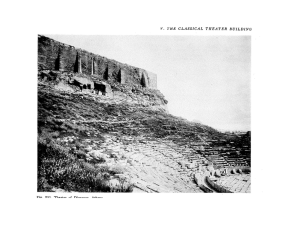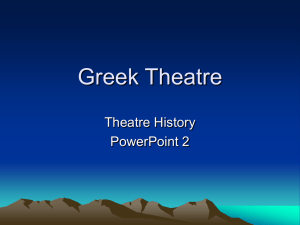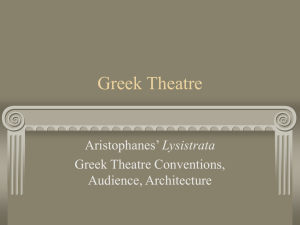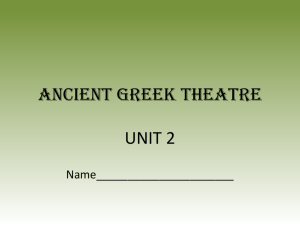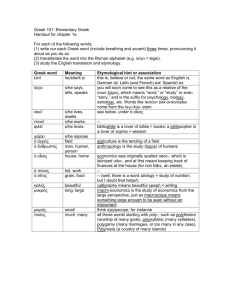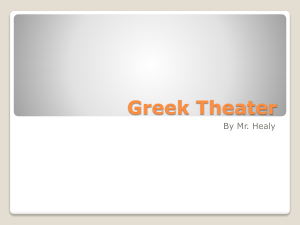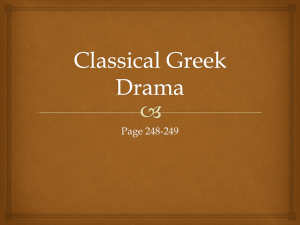Greek Theatre History: Origins and Key Figures
advertisement
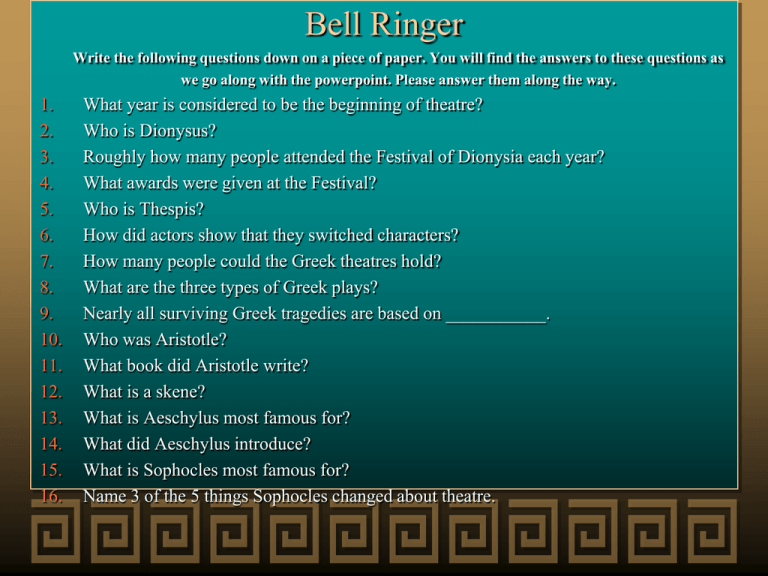
Bell Ringer Write the following questions down on a piece of paper. You will find the answers to these questions as we go along with the powerpoint. Please answer them along the way. 1. 2. 3. 4. 5. 6. 7. 8. 9. 10. 11. 12. 13. 14. 15. 16. What year is considered to be the beginning of theatre? Who is Dionysus? Roughly how many people attended the Festival of Dionysia each year? What awards were given at the Festival? Who is Thespis? How did actors show that they switched characters? How many people could the Greek theatres hold? What are the three types of Greek plays? Nearly all surviving Greek tragedies are based on ___________. Who was Aristotle? What book did Aristotle write? What is a skene? What is Aeschylus most famous for? What did Aeschylus introduce? What is Sophocles most famous for? Name 3 of the 5 things Sophocles changed about theatre. Learning Goal • Students will demonstrate knowledge of the creation of theatre. Objective • Students will be able to demonstrate knowledge of Theatre History with at least an 80% accuracy on their Powerpoint Questions Essential Question • How was theatre created? Agenda 1. Bell Ringer 2. Learning Goal/Objective/Essential Question 3. Powerpoint 4. Powerpoint Questions Scale • 0 – I don’t understand anything • 1 – With help, I understand some of what you’re saying • 2 – I understand the Festival of Dionysia • 3 – I understand the important people that created Greek theatre, the structure of the building, and the Festival of Dionysia • 4 – Along with all of level 3, I can interpret a scene from a classic Greek play. Homework • Bring in any art supplies you may want to use. We are doing an art project this week. Bring whatever you may want to decorate your mask in. (Ex – feathers, sequins, markers, crayons, colored pencils, glitter, jewels, construction paper, etc.) Greek Theater Drama was born in Ancient Greece! • 600s B.C. – Estimated date of the creation of theatre. • This began from the Greeks giving choral performances of dancing and singing Dionysus • • • • • Greek God of Wine and Harvest Believed to have invented wine. Performances began at festivals honoring Dionysus Over 15,000 people attended these yearly festivals Theatre was only performed at these festivals, and it was so important to the ancient Greeks that prisoners would be released from jail temporarily, so they could also attend. Festival of Dionysus • Tragedies performed as part of a civic celebration called the City Dionysia • Festival lasted several days • Prizes given for best tragedy, comedy, acting, and choral singing Thespis (534 B.C.) • 1st known Greek actor • Defined theater • art of acting a part on stage • dramatic impersonation of another character than yourself • Actors today are called Thespians in his honor Greek Theater • Actors change roles by changing their masks • In Greek drama the function of the orchestra is were the chorus of man and boys performed • Greeks build their theaters on hillsides. Could hold 20,000 people! • Players included a chorus and their leader • In Greek drama the chorus told the story through chanted lines. • Chorus performed in an “orchestra”, not on a raised platform Types of Greek plays • Tragedies – character suffers a disastrous end • Comedies – dramas with happy endings • Satyr – plays that made fun of great legends Sad Happy Greek Tragedies • Nearly all surviving tragedies are based on myth • Character’s struggle against hostile forces ended in defeat and ultimately (most of the time) in death • Episodes performed by a few actors - never more than 3 on stage • Wore masks to indicate the nature of the characters played. • Men played women’s roles • Same actor appeared in several parts. • Of the hundreds of Greek tragedies written, fewer than 35 survive. Aristotle • 1st known literary critic • Wrote a book about theater call The Poetics • This book as well as his other works analyzed the plays of the fifth century and of his own time, classified the kinds of drama, and laid down rules for the construction of tragedy. Aeschylus • Most famous for Oresteia • Introduced concept of second actor • Expanded possibilities for plot Sophocles • • • • • Name means wise and honored one. Most famous for writing Oedipus Rex Sophocles’ teacher was Aeschylus Sophocles wrote 120 plays Sophocles died at the age of 90 Sophocles changes to Greek theater • Increased the size of the chorus from 12 to 15 • Used 3 actors instead of two • Giving plays better structure • More believable characters in the plays • Plays were more realistic Layout of Greek Theatre Theatron – “Seating Place” where the audience sits Orchestra - “Dancing Place” Where the chorus performs Parados - The cast’s entrances to the orchestra Skene • Small building behind the orchestra • Front of the skene was used for scenery • Back of the skene was used to change the masks. Skene Review 1. 2. 3. 4. 5. 6. 7. 8. 9. 10. 11. 12. 13. 14. 15. 16. What year is considered to be the beginning of theatre? Who is Dionysus? Roughly how many people attended the Festival of Dionysia each year? What awards were given at the Festival? Who is Thespis? How did actors show that they switched characters? How many people could the Greek theatres hold? What are the three types of Greek plays? Nearly all surviving Greek tragedies are based on ___________. Who was Aristotle? What book did Aristotle write? What is a skene? What is Aeschylus most famous for? What did Aeschylus introduce? What is Sophocles most famous for? Name 3 of the 5 things Sophocles changed about theatre. Assignment • Use the materials provided (and any at home if you wish) to create your own Greek mask. • It can be as colorful and creative as you would like it to be. • Keep in mind – • whether your mask is for a comedy or tragedy • Whether your character is male or female
